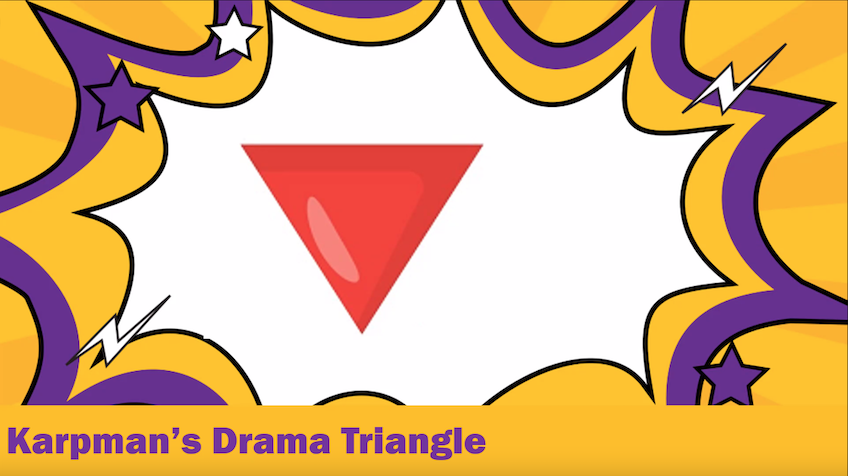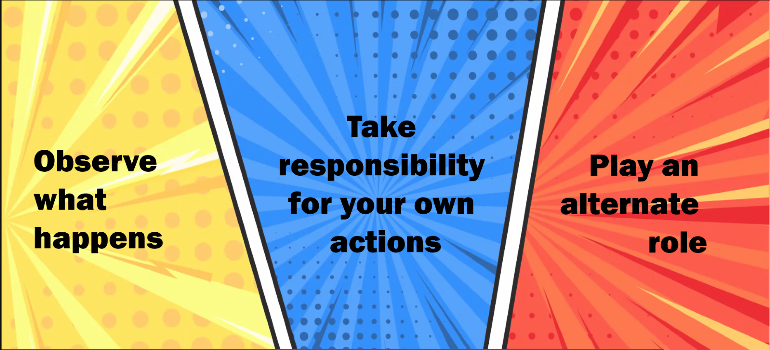As Product Managers, we constantly find ourselves knee-deep dealing with strategic decisions, prioritisation and leading without authority – all of which can create anxiety and conflict in our day. But how should we approach this drama, and are there ways to flip the switch? In September, Kate Edwards-Davis introduced us to the Karpman Drama Triangle to help illustrate the dynamics of this drama.
The Karpman Drama Triangle
The Karpman Drama Triangle, developed by Stephen B Karpman, is a social model that describes the human interactions between three opposing roles:
- Victim;
- Persecutor (Villain); and
- Rescuer (Hero)
Karpman represents these roles within an inverted triangle, to demonstrate the natural hierarchy, with the persecutor and rescuer being in positions of power or authority above the victim.

The Victim can commonly feel powerless, helpless or oppressed. They may hold a sense of pity for themselves, and feel incapable of negotiating or meeting the demands of the persecutor. Surprisingly, the victim usually initiates the drama, when they seek out a rescuer to save them, which in reality can reinforce the Victim’s negative mindset.
The Rescuer (or Hero) can be perceived to have an authority or mastery, which we don’t recognise in the victim, and will step in to save the victim from the persecutor. The victim encourages this belief, as it is easier to be rescued rather than being accountable.
The Persecutor (or Villain) may be critical of the victim. They blame the victim for failing, or perhaps even for the anticipation of failure. They might feel superior to the victim, and that the victim’s actions (or rather inactions) are holding them back. Often, a person may assume the persecutor role due to being a victim in another triangle.
In reality, everybody oscillates between all three roles in different situations. The repetition and switching of roles reinforces the cycle, and can cause the participants’ actions and reactions to fall into dysfunctional patterns.
Who is the winner in this circle (triangle) of drama?
Nobody wins.
Everybody feels justified in their position.
- The Persecutor avoids accountability, as it is always somebody else’s fault. Some common traits include not knowing how to use authority with compassion, or how to ask for something difficult. They struggle to challenge others without threats or aggression.
- The Rescuer receives gratification from having somebody depend on them. However, their actions prevent the victim’s own self-empowerment.
- The Victim finds it easier to not take responsibility for their own feelings when challenged in a difficult situation. They seek safety and protection from others, and feel valued by having others take pity on them.
Beating the Triangle
We need to learn to recognise the triangles around us, so that we can avoid them if we can.
If avoidance is not possible, or it’s too late and we’re already in a triangle, then we should reflect on our own role first, and how our interactions may be contributing and prolonging the triangle. Resist the temptation of judging others and their intentions. We need to shift our own mindset first.
There are some alternative triangles to counter the drama triangle.
The Empowerment Dynamic
- The Challenger (instead of Persecutor) makes the requests and gives constructive feedback to drive the team forward.
- The Coach (instead of Rescuer) empowers the victim to help themselves.
- The Creator (instead of Victim) accepts and pursues the challenge.
The Compassion Triangle (OR Winners Triangle)
- The Persecutor needs to use assertion rather than aggression.
- The Rescuer needs to care for the victim, encourage and acknowledge their capabilities, rather than taking over and solving the problems for them.
- The Victim needs to accept the challenge, and admit their vulnerabilities. Be accountable but also seek the appropriate guidance.

Resources and Slides
Some of the resources mentioned during this session included:
- The Official Site of the Karpman Drama Triangle;
- Winners Triangle (Compassion Triangle) by Acer Choy;
- The Power of TED (The Empowerment Dynamic) by David Emerald Womeldor;
- Games People Play by Eric Berne, MD;
Thank you
Thank you again to our presenter, Kate Edwards-Davis for sharing, our volunteers Nosh, Gwen and Steve, and our host and Zoom sponsors, Cogent – who help companies build great products loved by millions of users, from small startups through to tech giants like Square, Xero and REA.
